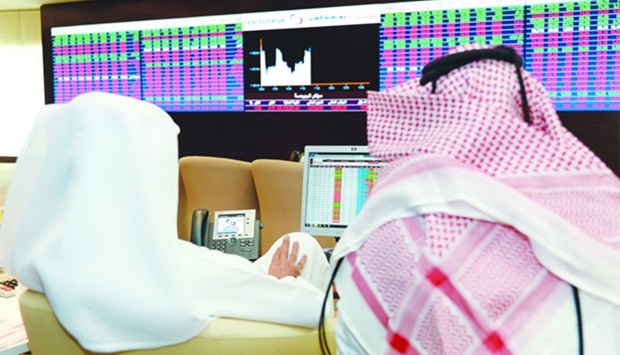The optimism among foreign and Gulf institutions particularly drove the 20-stock Qatar Index up 1.22% to 9,913.75 points, a day after Opec announced its historic deal to cut production by 1.2mn barrels per day.
Midcap equities largely came under buying spotlight in the bourse, whose year-to-date losses have narrowed down to under 5%, having hit about 8% in the recent past.
Trade turnover and volumes however declined substantially in the market, where telecom, industrials and banking sectors together accounted for more than 78% of the total volume.
Islamic stocks were seen gaining relatively faster than the conventional ones in the bourse, where local retail investors and domestic institutions however turned profit takers.
Market capitalisation expanded about QR7bn or 1.31% to QR533.89bn as mid, small, large and microcap equities gained 2.47%, 0.89%, 0.78% and 0.56% respectively.
The Total Return Index soared 1.22% to 16,039.78 points, All Share Index by 1.2% to 2,730.37 points and Al Rayan Islamic Index by 1.92% to 3,663.06 points.
Industrials sector saw its index shoot up 2.83%, real estate (1.37%), consumer goods (1.36%), banks and financial services (1.03%) and telecom (0.75%); whereas insurance and transport fell 1.64% and 0.03% respectively.
About 77% of the traded stocks extended gains with major movers being Industries Qatar, Gulf International Services, Qatari Investors Group, Vodafone Qatar, QNB, Ooredoo, United Development Company, Ezdan, Barwa, Commercial Bank, Doha Bank, Masraf Al Rayan, Alijarah Holding and Islamic Holding Group.
Nevertheless, Qatar Insurance, Qatar First Bank, Nakilat, Salam International Investment and Medicare Group saw their stocks lose sheen.
Non-Qatari institutions turned net buyers to the tune of QR102.04mn compared with net sellers of QR100.8mn on November 30.
The GCC (Gulf Cooperation Council) institutions’ net buying strengthened substantially to QR46.07mn against QR16.25mn on Wednesday.
However, domestic institutions turned net sellers to the extent of QR105.93mn compared with net buyers of QR48.87mn the previous day.
Local retail investors were also net sellers to the tune of QR44.48mn against net buyers of QR21.2mn on November 30.
Non-Qatari individual investors’ net buying weakened perceptibly to QR1.04mn compared to QR10.5mn on Wednesday.
The GCC individual investors’ net buying declined to QR1.19mn against QR3.98mn the previous day.
Total trade volume fell 65% to 12.73mn shares, value by 43% to QR370.37mn and deals by 35% to 3,842.
There was 85% plunge in the telecom sector’s trade volume to 4.08mn equities, 83% in value to QR42.92mn and 76% in transactions to 620.
The banks and financial services sector’s trade volume plummeted 55% to 2.29mn stocks, value by 60% to QR86.78mn and deals by 26% to 1,006.
The insurance sector reported 53% shrinkage in trade volume to 0.08mn shares, 58% in value to QR5.91mn and 17% in transactions to 111.
The real estate sector’s trade volume tanked 47% to 1.08mn equities, value by 36% to QR24.38mn and deals by 5% to 439.
The market witnessed 14% decline in the transport sector’s trade volume to 0.67mn stocks, 35% in value to QR17.35mn and 24% in transactions to 252.
However, the industrials sector’s trade volume more than tripled to 3.62mn shares and value more than doubled to QR166mn on 47% increase in deals to 1,000.
The consumer goods sector’s trade volume almost tripled to 0.91mn equities but on a 2% jump in value to QR27.03mn and 11% in transactions to 414.
In the debt market, there was no trading of treasury bills and government bonds.


